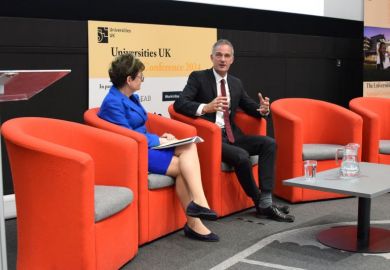The UK government has pledged to fund more Turing fellowships, provide more money for artificial intelligence-focused degree courses and create a new “Rhodes Scholarship for AI” to support the uptake and investment of the disruptive technology.
Under a raft of measures unveiled on 13 January, researchers will also be given greater access to public datasets and UK Research and Innovation will be asked to engage with the planned National Data Library “to identify how the creation of valuable high-quality datasets that support the research community could be better acknowledged via the Research Excellence Framework”.
More international compute partnerships are planned with “like-minded countries to increase the types of compute capability available to researchers and catalyse research collaborations”, it adds.
The high-profile commitments come as the government pledged to back all 50 recommendations of the AI Opportunities Action Plan written by Matt Clifford, chair of the Advanced Research and Invention Agency (Aria).
While many of its recommendations focus on increasing the UK’s AI capability by at least 20 times by 2030, largely by incentivising private investment, several of its recommendations related to skills and education will require significant state investment.
These include plans for a “flagship undergraduate and master’s AI scholarship programme on the scale of Rhodes, Marshall, or Fulbright for students to study in the UK”.
“Open to a diverse initial cohort of 100 scholars from the UK and abroad, the programme would combine financial support, cohort building, industry co-investment, and placements in government or private sector AI organisations,” explains the plan, published on 13 January.
The Rhodes Scholarship provides funding for about 100 postgraduates to study at the University of Oxford every year, while the Marshall Scholarship funds about 50 American postgraduates to study in the UK. The Fulbright Program, funded by the US government, provides about 8,000 grants a year for international study.
In its detailed response to the plans, the government explains how “DSIT will work with UKRI to explore whether the AI scholarships are best placed at undergraduate, master’s or PhD level with the aim to establish a new, prestigious scheme by autumn 2026”.
In addition, Clifford also recommends that “15 new Turing AI Pioneer Fellowships should be created for specialists in other sectors who wish to develop deep technical skills in AI”.
“At the same time, funding for 25 more Turing AI Acceleration and AI World-Leading fellowships should be committed to maintain the current cohort size over the next three years, as existing fellows graduate from the programme,” he says.
On more general training, Clifford urges the government to “support higher education institutions to increase the numbers of AI graduates and teach industry-relevant skills”.
While the 46,000 students who graduated from an AI-relevant higher education programme in the UK in 2022 was “the highest in Europe, with Germany (32,000) second”, the UK is behind Finland and others on a per capita basis and there “remains unmet demand for skilled workers”, says Clifford, citing the Stanford AI Index which puts Ireland, the Netherlands and Norway ahead of the UK on this metric.
“Supporting universities to develop new courses co-designed with industry – such as the successful cooperative education model of Canada’s University of Waterloo, CDTM at the Technical University of Munich or France’s CIFRE PhD model – and increasing their teaching and recruitment capacity would help train the tens of thousands of AI professionals needed by 2030,” he says.
“In the next five years, the UK must be prepared to train tens of thousands of additional AI professionals across the technology stack to meet expected demand and proactively increase its share of the world’s top 1,000 AI researchers,” he adds.
In addition, the UK should “explore how the existing immigration system can be used to attract graduates from universities producing some of the world’s top AI talent”, he says, noting how “graduates from some leading AI institutions, such as the Indian Institutes of Technology and (since 2020) Carnegie Mellon University in the US, are not currently included in the High Potential Individual visa eligibility list”.
Welcoming the report and accepting its recommendations, science secretary Peter Kyle said the government was “determined that the UK is not left behind in the global race for AI, that’s why the actions we commit to will ensure that the benefits are spread throughout the UK so all citizens will reap the rewards of the bet we make today”.
Tim Bradshaw, chief executive of the Russell Group, welcomed the government blueprint, including support for academic expertise in this area.
“Through multidisciplinary expertise, a pipeline of academic talent and well-established industry partnerships, research-intensive universities are already harnessing AI technologies for public good and attracting significant external investment,” he said.
“However, for some time the UK has been lacking a clear strategy on AI, leaving us vulnerable to falling further behind our global competitors. We therefore welcome this new, ambitious plan to maximise the potential benefits of AI that could boost productivity, improve public services and drive economic growth.”
Register to continue
Why register?
- Registration is free and only takes a moment
- Once registered, you can read 3 articles a month
- Sign up for our newsletter
Subscribe
Or subscribe for unlimited access to:
- Unlimited access to news, views, insights & reviews
- Digital editions
- Digital access to THE’s university and college rankings analysis
Already registered or a current subscriber?








